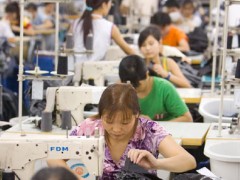Are Shoppers Really to Blame for Factory Working Conditions?
 It’s no secret that fast fashion retailers employ factories in developing countries to churn out large quantities of cheap clothing that consumers gobble up, but now there are reports that the high demand for low-priced, trendy outfits is overwhelming for laborers in poor countries. {the Guardian}
It’s no secret that fast fashion retailers employ factories in developing countries to churn out large quantities of cheap clothing that consumers gobble up, but now there are reports that the high demand for low-priced, trendy outfits is overwhelming for laborers in poor countries. {the Guardian}
Apparently workers are often faced with tasks that are nearly impossible to complete as quickly as western retailers want while maintaining humane conditions, but they simply cannot afford to turn down jobs. The result is few breaks for food or to use the bathroom and bodily wear and tear. {The Cut}
What is most troubling, according to the story, is that a retailer’s claim to employ ethical factory standards basically means nothing.
The Ethical Trading Initiative, a voluntary industry body that many UK retailers belong to has been criticized for being too weak. Spokeswoman Julia Hawkins concedes that “ethical trade doesn’t mean that there’s a cast-iron guarantee that the person who made that T-shirt has been treated right. It’s about company behavior. It tells you they are working to improve.” {the Guardian}
The Guardian story suggests consumers, who, as a whole, really dig fast fashion, are as much at fault for these unfortunate circumstances as the retailers.
The Cut points out, however, that a boycott of all fast fashion retailers won’t help factory workers in developing countries earn money, receive health benefits and achieve fair working conditions.
Consumer demand can certainly be a cause of Western retailers overworking their factory laborers, but is a mall shopper really responsible for the behavior of a company that purports to abide by ethical standards? Demand is one thing, but executives who lack business morals have far more impact on operational decisions than consumers. These days everyone is told to shop the economy back into shape, and the Guardian’s reasoning that a high demand for certain goods is damaging to poor workers is contradictory. Few consumers would support oppressive working conditions, but changes in labor laws and company standards, with international independent groups that can provide oversight to ensure fair working conditions would go further in making positive changes than playing pin the blame on the consumer.
